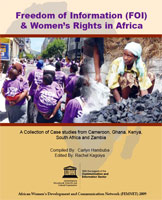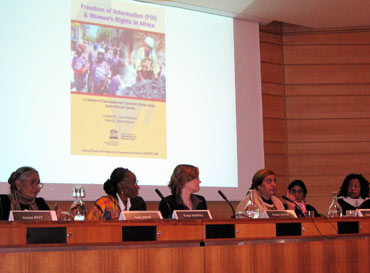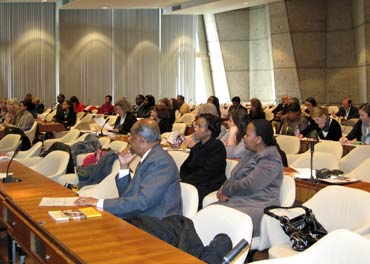UNESCO urges involvement of women’s organizations in promoting freedom of information in Africa
30-03-2010 (Paris)

Cover page of the resource book
© UNESCO
As part of the celebrations of International Women’s Day 2010, UNESCO hosted a roundtable discussion in Paris on 16 March 2010, which highlighted the relevance of freedom of information (FOI) as a tool for advancing women’s rights and empowerment in Africa. The occasion served to formally launch a resource book published by the African Women’s Development and Communication Network (FEMNET) with support from UNESCO.
Entitled Freedom of Information (FOI) and Women’s Rights in Africa, the resource book compiles case studies from Cameroon, Ghana, Kenya, South Africa and Zambia. It constitutes the first stage of a wider initiative aiming to foster women’s engagement in the formulation, adoption and implementation of FOI laws in the region.
The roundtable included presentations by two of the researchers involved in the development of the publication, Carlyn Hambuba (FEMNET) from Kenya, where freedom of information legislation has not been enacted; and Chantal Kisoon (South African Human Rights Commission), whose experience is framed by the South African Promotion of Access to Information Act passed in 2000.
During the opening remarks, the UNESCO representatives, Gulser Corat and Wijayananda Jayaweera, underscored the importance of the resource book’s topic, which is intrinsically connected to UNESCO’s global priorities of Gender Equality and Africa, and its mandate to promote freedom of expression. Konji Sebati (Permanent Delegate of South Africa to UNESCO) strongly supported the view of freedom of information as a fundamental right central to democratic governance, empowerment, socio-economic development, geo-political understanding and tolerance. “Africa’s priority needs can never be achieved without the involvement of women on the continent, and without information, how can they then get involved?” she stated.
In light of the linkages between freedom of information and women’s rights, the African panelists participating in the roundtable expressed concern for the low involvement of women organizations in processes to advance freedom of information in the region, despite the potential advantages of better information flows for their advocacy work. They related poor engagement to the lack of awareness on freedom of information and on how it may benefit socio-economic objectives. Common doubts about the confidence that can be placed on the accuracy of government-disclosed data, along with the complexity of freedom of information legislation and the failure to promote its ownership by the grassroots were mentioned as well.
In the case of South Africa, another aspect to take into account is that women organizations, who actively participated in putting an end to the apartheid era, may wrongly perceive the demand for information access as an act of opposition to a government they strived to put in power. Also highlighted was the relevance of setting up structures to protect those who disseminate information, and of information being made public in a language understandable to all sectors of a country’s population.
The speakers agreed that media can play a crucial role in furthering women’s rights through enhanced information, although this should not lead to the conclusion that the right to know only concerns the press. In order to adequately fulfill their part, however, media professionals need to be knowledgeable on women’s issues and international instruments guaranteeing them. The relevance of sustained training, the promotion of women’s leadership and a gender-sensitive work environment, the establishment of well defined, monitored and evaluated gender policies and programmes in media houses, journalist unions and professional associations were also stressed, along with fostering a portrayal of women by the media that avoids stereotyping.
In India, freedom of information legislation resulted from grassroots demand for political accountability, following a growing awareness that the right to know facilitates access to all other rights. Women were significantly involved in advocating the passing of India’s Right to Information Act (2005). The Indian experience shows that the struggle must continue after enactment, to ensure the legislation’s effective implementation. Aruna Roy (Indian National Campaign for People's Right to Information) encouraged women’s engagement in these efforts. She also suggested African panelists to speak to women about democracy, pluralism and issues they face not only based on gender, but also in connection to religious differences and poverty. It is relevant to understand those divisions that exist among women themselves, think about how best they can act with each other and work on the relationships between them.
The resource book Freedom of Information (FOI) and Women’s Rights in Africa constitutes the beginning of an ongoing project. Taking stock of the insights emerging from the roundtable discussion, UNESCO plans to continue partnering with FEMNET in disseminating the publication, as well as in the design and implementation of other follow-up activities.
The roundtable included presentations by two of the researchers involved in the development of the publication, Carlyn Hambuba (FEMNET) from Kenya, where freedom of information legislation has not been enacted; and Chantal Kisoon (South African Human Rights Commission), whose experience is framed by the South African Promotion of Access to Information Act passed in 2000.
During the opening remarks, the UNESCO representatives, Gulser Corat and Wijayananda Jayaweera, underscored the importance of the resource book’s topic, which is intrinsically connected to UNESCO’s global priorities of Gender Equality and Africa, and its mandate to promote freedom of expression. Konji Sebati (Permanent Delegate of South Africa to UNESCO) strongly supported the view of freedom of information as a fundamental right central to democratic governance, empowerment, socio-economic development, geo-political understanding and tolerance. “Africa’s priority needs can never be achieved without the involvement of women on the continent, and without information, how can they then get involved?” she stated.
In light of the linkages between freedom of information and women’s rights, the African panelists participating in the roundtable expressed concern for the low involvement of women organizations in processes to advance freedom of information in the region, despite the potential advantages of better information flows for their advocacy work. They related poor engagement to the lack of awareness on freedom of information and on how it may benefit socio-economic objectives. Common doubts about the confidence that can be placed on the accuracy of government-disclosed data, along with the complexity of freedom of information legislation and the failure to promote its ownership by the grassroots were mentioned as well.
In the case of South Africa, another aspect to take into account is that women organizations, who actively participated in putting an end to the apartheid era, may wrongly perceive the demand for information access as an act of opposition to a government they strived to put in power. Also highlighted was the relevance of setting up structures to protect those who disseminate information, and of information being made public in a language understandable to all sectors of a country’s population.
The speakers agreed that media can play a crucial role in furthering women’s rights through enhanced information, although this should not lead to the conclusion that the right to know only concerns the press. In order to adequately fulfill their part, however, media professionals need to be knowledgeable on women’s issues and international instruments guaranteeing them. The relevance of sustained training, the promotion of women’s leadership and a gender-sensitive work environment, the establishment of well defined, monitored and evaluated gender policies and programmes in media houses, journalist unions and professional associations were also stressed, along with fostering a portrayal of women by the media that avoids stereotyping.
In India, freedom of information legislation resulted from grassroots demand for political accountability, following a growing awareness that the right to know facilitates access to all other rights. Women were significantly involved in advocating the passing of India’s Right to Information Act (2005). The Indian experience shows that the struggle must continue after enactment, to ensure the legislation’s effective implementation. Aruna Roy (Indian National Campaign for People's Right to Information) encouraged women’s engagement in these efforts. She also suggested African panelists to speak to women about democracy, pluralism and issues they face not only based on gender, but also in connection to religious differences and poverty. It is relevant to understand those divisions that exist among women themselves, think about how best they can act with each other and work on the relationships between them.
The resource book Freedom of Information (FOI) and Women’s Rights in Africa constitutes the beginning of an ongoing project. Taking stock of the insights emerging from the roundtable discussion, UNESCO plans to continue partnering with FEMNET in disseminating the publication, as well as in the design and implementation of other follow-up activities.
 The roundtable discussion
The roundtable discussion© UNESCO
 The roundtable discussion
The roundtable discussion© UNESCO
Related themes/countries
· Africa
· Gender and ICT
· WebWorld Newsletter - subscription form
· Freedom of Information
Share this story:
Contact information
- UNESCO
Source














